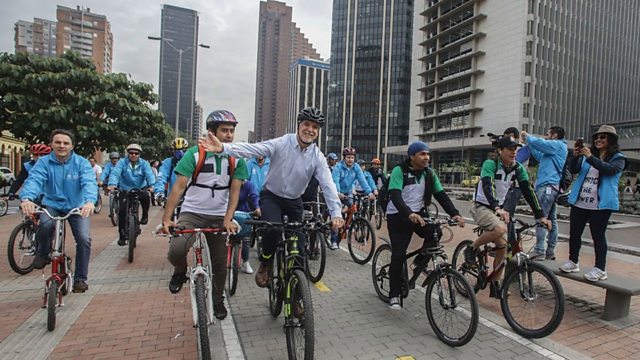World Mayor
Dorothy Thornhill, the first elected female mayor in Britain, looks at how mayors are delivering change in the world’s cities.
We visit the mayors of cities from Helsinki to Bogota, from Los Angeles to Rotterdam and Cape Town to discover why citizens are putting their faith in the ability of local government and a charismatic mayor to deliver a better quality of life and solutions to 21st Century problems.
We report from the first World Parliament of Mayors that was convened in the Hague in September and which seeks to give mayors a stronger political voice internationally.
The driving idea is that cities, where the majority of the world population now lives, have much in common with one another and that the challenges they face – migration, health, trade, climate change, security, terrorism – are issues that cross national borders.
Mayors are highly accountable democratically, with a strong imperative to get things done. Often they are in charge of cities with populations of many millions – but they are often more free and less politically partisan than their colleagues in national government. Increasingly it is mayors and their administrations who are taking the lead on solutions for housing, cleaner air and water, crime reduction and the ‘greening’ of cities.
But does the office of mayor confer too much power to one individual? We look at the rise of women majors - why is it that the mayors of Paris, Rome, Barcelona, Madrid, Cologne, Warsaw, Prague, Bucharest and a swathe of cities across the world now have women mayors?
Last on
More episodes
Previous
Next
Broadcasts
- Tue 28 Feb 2017 00:32GMT����ý World Service except News Internet
- Tue 28 Feb 2017 03:32GMT����ý World Service Americas and the Caribbean
- Tue 28 Feb 2017 05:32GMT����ý World Service Online, Europe and the Middle East, South Asia & UK DAB/Freeview only
- Tue 28 Feb 2017 06:32GMT����ý World Service East Asia
- Tue 28 Feb 2017 07:32GMT����ý World Service Australasia
- Tue 28 Feb 2017 09:32GMT����ý World Service Americas and the Caribbean
- Tue 28 Feb 2017 13:32GMT����ý World Service except Americas and the Caribbean & News Internet
- Tue 28 Feb 2017 19:32GMT����ý World Service except East and Southern Africa, News Internet & West and Central Africa
- Tue 28 Feb 2017 21:32GMT����ý World Service East and Southern Africa & West and Central Africa only

